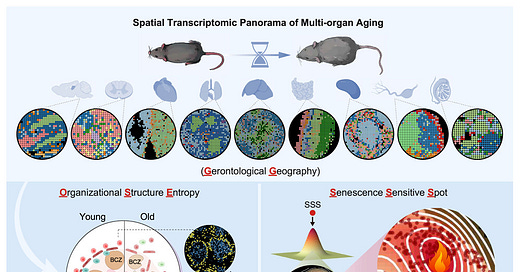Beyond the Spike Protein Itself: How COVID Gene Therapies Almost Certainly Accelerate Aging Via Elevated IgG
A new study shows that elevated IgG antibody levels alone trigger aging in multiple tissues.
As readers of this Substack are well aware, I published a, dare I say, now “iconic” graphic detailing how the Spike Protein of SARS-CoV-2 induces all Nine Hallmarks of Aging.
Hallmarks of Aging and the Spike
https://wmcresearch.org/hallmarks-of-aging-and-the-spike/
However, there is now a Tenth way the Spike Protein can accelerate aging – when it is used to induce the production of IgG antibodies. A paper published online November 4th shows that excess levels of IgG antibodies themselves accelerate aging. Before we examine the evidence, let’s look at what a normal IgG antibody level should be.
As a rule of thumb, the normal adult range for serum IgG is usually considered to be from about 600-1700 mg/dL, but these numbers may vary from laboratory to laboratory. It is important to remember that the actual number is not as important as whether symptoms are also occurring that suggest a potential problem.
Normal IgG Levels by Age: Understanding Immunoglobulin
https://www.patientpower.info/navigating-cancer/normal-igg-levels-by-age
Now, what happens after you receive a COVID gene therapy (or other vaccines) is that you experience a dramatic increase in the amount of serum IgG.
Serum baseline SARS-CoV-2 spike-specific IgG and IgA levels (Figure 1 and eTable 1 in Supplement 1) were elevated in individuals with previous infection and increased to higher levels following vaccination, compared with SARS-CoV-2–naive individuals. Among SARS-CoV-2–naive patients, at all times following vaccination, serum anti–spike IgG and IgA levels were significantly higher in the mRNA-1273 compared with the BNT162b2 groups (IgG: 285.4 vs 117.5 BAU/mL at day 29, 2090.9 vs 1292.4 BAU/mL at day 57, and 395.4 vs 247.9 BAU/mL at day 180 [P < .001 for all comparisons]; IgA: 217.1 vs 74.4 BAU/mL at day 29, 603.9 vs 249.4 BAU/mL at day 57, and 119.2 vs 63.0 BAU/mL at day 180 [P < .001 for all comparisons]).
Serum and Salivary IgG and IgA Response After COVID-19 Messenger RNA Vaccination
https://jamanetwork.com/journals/jamanetworkopen/fullarticle/2817863
Mind you, the above are JUST Spike IgG levels.
We have come to the place where we talk about the new findings. What researchers in China have discovered is that elevated levels of IgG themselves accumulate in tissues, exacerbating tissue aging.
Thus, we have identified a consistent pattern of intra-tissue IgG accumulation across multiple life stages, sexes, and species, supporting that our observations represent a widespread phenomenon in mammals and could serve as a marker of human aging.
Next, we aimed to determine if elevated systemic IgG levels are sufficient to trigger aging in multiple tissues. To test this, we administered IgG intraperitoneally to 6-month-old mice and then evaluated various aging-associated biomarkers (Figure 7A). Notably, after 100 days of IgG treatment, we observed an accumulation of IgG in the spleen, lymph nodes, hippocampus, lung, and heart (Figures 7B and 7C). This IgG accumulation led to a marked senescence phenotype, characterized by increased levels of the aging marker P21 and the presence of pro-inflammatory cytokines and indicators of fibrosis.
Thus, our study sheds light on the dual role of IgG in the context of aging: while essential for immune protection in and of itself, its excessive accumulation may lead to cellular senescence and chronic inflammation, both of which are characteristic features of aging. Given our discovery that IgG levels rise in human tissues as aging progresses, we propose that immunoglobulin-driven processes may represent a critical mechanism underlying aging, which we term “immunoglobin-associated senescence phenotype (IASP).”
Spatial transcriptomic landscape unveils immunoglobin-associated senescence as a hallmark of aging
https://www.cell.com/cell/abstract/S0092-8674(24)01201-7
To me, this is alarming. The idea of dramatically, artificially increasing levels of serum IgG 2-3 times a year (for one disease alone!) is terrifying, given these results. We have yet another way the Spike Protein, this time with “assistance,” can accelerate the age of mankind!
Indeed, it would seem that we need to completely reevaluate vaccines. If a vaccine needs a booster, how valuable is it? How often is it safe to boost IgG levels? Might it be accelerating the recipient towards the grave, rather than away from the hospital? We must find the answers




I think this phenomenon is occurring in my sister. I cannot fathom how her MD's/NP's at Memorial Sloan Kettering have recommended that she continue to follow CDC recommendations to get more booster shots. Do you think anyone at either of these institutions is reading these papers and comprehending what it is they are potentially doing to their patients? Feels Insane.
Blood markers and related lab determinations of IgG antibodies, etc aside, one can clearly observe frightening changes in others evidencing accelerated systemic aging, though sadly/apparently many don't see it themselves :o Had a conversation on this very point over the weekend, scary and then some :((